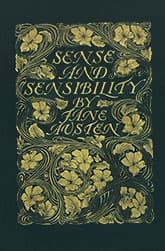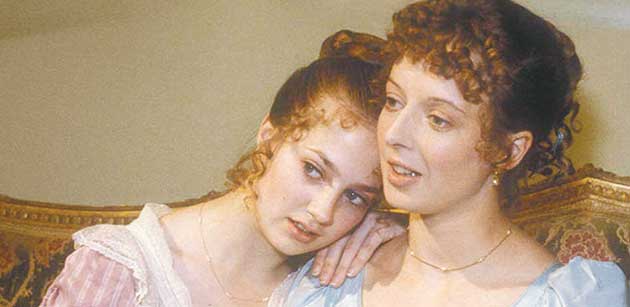Sense and Sensibility
Critique • Quotes • At the movies
 1899 edition
1899 editionFirst publication
1811
Literature form
Novel
Genres
Literary, romance
Writing language
English
Author's country
England
Length
Approx. 119,500 words

Elinor (Irene Richard, right) is all sense and Marianne (Tracey Childs) all sensibility in miniseries.
The eternal struggle
Sense and Sensibility (1981): Television miniseries, approx. three hours; director Alexander Baron; writer Rodney Bennett; featuring Irene Richard, Tracey Childs, Diana Fairfax, Bosco Hogan, Robert Swann, Peter Woodward
Adaptations of Jane Austen's first-published novel, Sense and Sensibility, lag well behind the numerous productions of her more acclaimed later works, especially Pride and Prejudice and Emma. But there's something about that early work that endures, making it still a great subject for adaptation into modern media.
That something may be the battle between the rational and the romantic view of life. Austen took it up as her theme as she was writing her way out of the Gothic sensational style popular during her youth and navigating the new enlightened romanticism developing in the arts. This is especially evident in her first-written novel, Northanger Abbey, but the search for the best balance of intellect and feeling was also her characters' journey in Sense and Sensibility—and remained an issue to some degree in all her subsequent works.
This struggle still resonates with readers today. We may no longer care about the courtship rituals of British gentry but we are still concerned with the battle of heart and brain in choosing mates, as well as in other life decisions. We have our own influential romantic narratives pitted against our own world's practical considerations.
Screen, stage and sound adaptations of this novel—some faithful to Austen, some only vaguely related, and some rewriting the novel completely for modern audiences—continue to appear, each resolving the primal conflict in its own way.
Over-the-top emotion and back
The 1981 serial is the plodding but sincere version that might be recommended for students learning the book, though not for anyone seeking pure entertainment. The series is quite faithful to the novel, though fans of the novel may find their appreciation marred by two strange omissions: one of the three Dashwood sisters is missing and the end of the story is cut short.
Each of the seven half-hour episodes of this BBC show starts with the same tableau over the titles: Elinor and Marianne on a seesaw (teeter-totter in North American-speak) facing each other. The production is obviously signalling it will focus on the relationship of the two elder sisters, representing the two opposing halves of the title. I'm not sure whether it is also meant to foreshadow that when one sister is up, the other is down, and vice versa.
Very quickly in the story, the two young women take up their positions. An early exchange allows no confusion:
Marianne: Elinor, where are your feelings?
Elinor: I govern them.
In the first half of the story, the sisters are almost caricatures of these attitudes. Marianne (Tracey Childs) is lively, petulant and given to over-the-top romantic gestures. Big sister Elinor (Irene Richard) goes in the opposite direction, beyond controlled and thoughtful to nearly inanimate. As the low-key narrative develops, a bit of nuance creeps into their performances, until they each get their comeuppances and come closer together.
The youngest sister is not missed much. The only effect is that the Dashwood household—consisting of the two remaining sisters and their mother—is a little more claustrophobic as the girl's minor escapades are not available to distract us from the intense dramas befalling the women.
An episode of the 1981 BBC serial of Sense and Sensibility.
The cast as a whole is undistinguished. They carry out heir roles competently as found in the novel, seriously but without flare.
The biggest disappointment is Robert Swann as Marianne's admirer Colonel Brandon, with Elinor's eventual match, Edward Ferrars (Bosco Hogan), a close second. Swann's as dull as they come, at least in the early going, though he does grow on one near the end—all of which which may be appropriate for the character as Austen wrote him, but hardly makes for scintillating drama.
Oddly, the character with the most screen presence may be the conflicted scoundrel Willoughby (Peter Woodward). Though this may not be so strange, as Austen tends to create villains more colourful than her more socially conventional leading men.
After Elinor and Ferrars have agreed to marry, the series finishes on a small scene between Brandon and Marianne, indicating they are growing closer but without resolving their relationship. This abrupt ending leaves out Austen's happy wrap-up of the drama with multiple marriages and families.
Perhaps the filmmakers finally realized that not every scene from the novel had to be included, that the excessive thoroughness of this adaptation has caused the drama to drag—though at that point it was too late to trim anything but the finale.
— Eric

